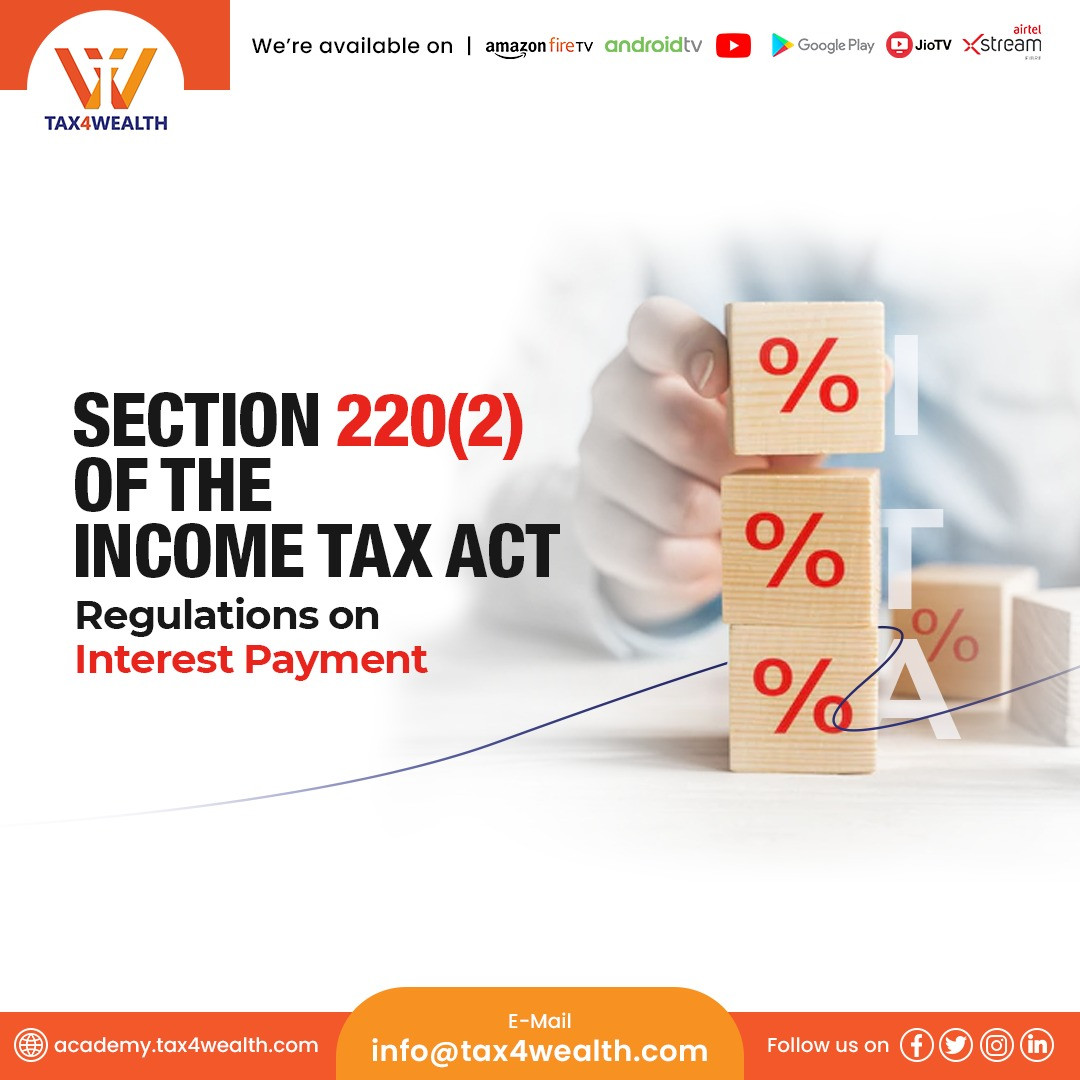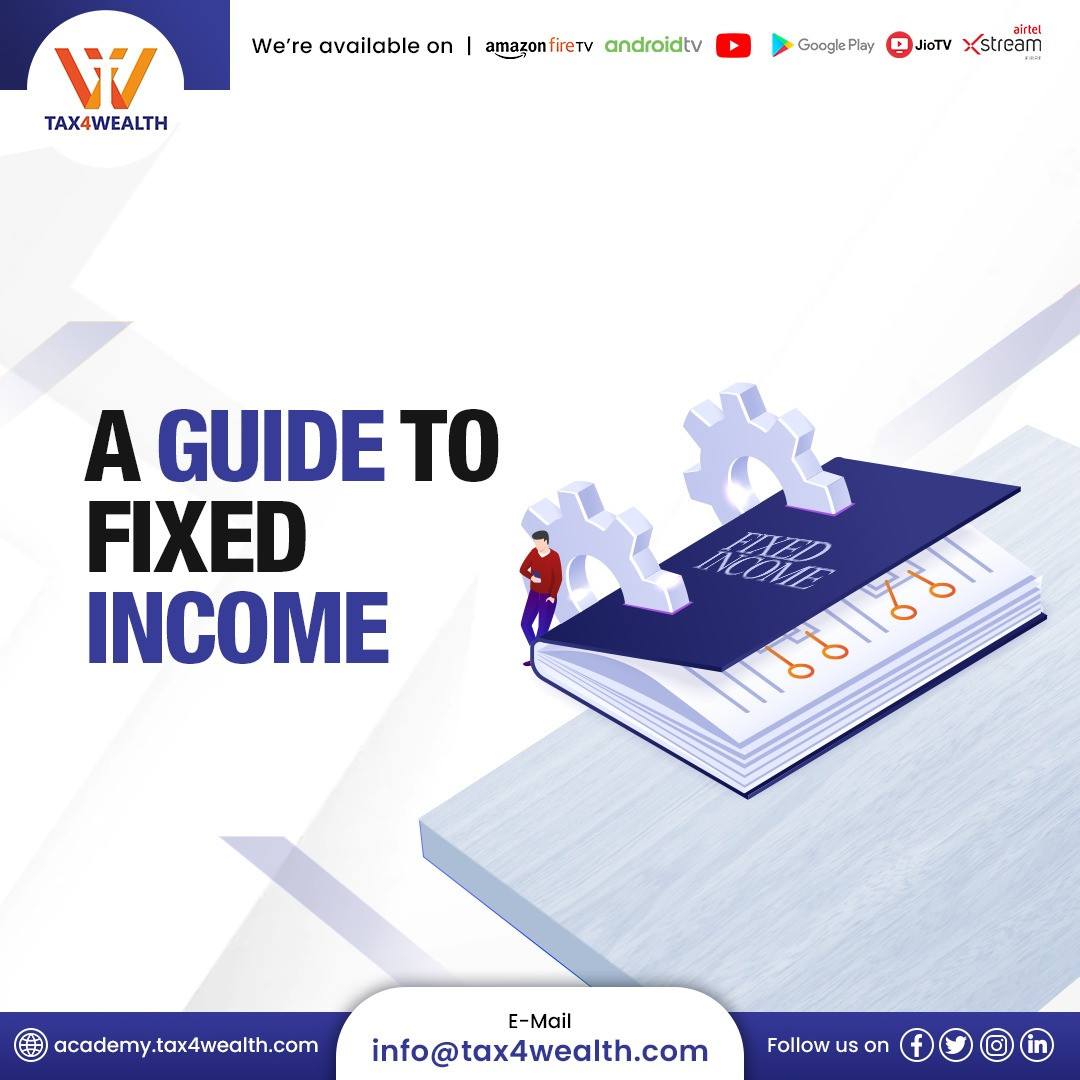
Section 220(2) of the Income Tax Act - Interest Payment Regulations
What does the Income Tax Act's Section 220(2) mean? Learn about the Income Tax Act's payment requirements and the severe legal penalties in Section 220 (2).
The Income Tax Act includes provisions for late payment of tax demands, interest, and penalties under Section 220. (2). It stipulates that if the specified sum is not paid within 30 days, the taxpayer shall pay 1% interest every month. Section 220(2) of the Income Tax Act states that the Assessing Officer may only cut or remove interest if there is a good explanation. The taxpayer must pay interest under the Income Tax Act section 220(2) until the whole amount specified in the demand letter is paid.
What Is the Income Tax Act?
The Income Tax Act of 1961 is the legislation used in India to impose, manage, collect, and recoup income tax. It went into effect on April 1, 1962.
Individuals are liable to income tax, as well as any applicable surcharges and cess, at the rates set out in the applicable Central Act for the fiscal year. The Income Tax Act establishes separate standards for taxing income that has been received in advance as well as income that has not yet been received. A person must keep track of the TDS deducted when calculating his overall tax burden at the end of the year.
To Learn all the TDS related content Click here 👉 TDS Course- How to File TDS Returns Online
Every person's income must be classified under one of the following categories, as stipulated by the Act: -
- Revenue from a home investment
- Salaries
- Earnings from unrelated sources
- Profits from a business or profession
- Capital gains
Types of Taxes :
Income tax is important because it provides cash to keep our government running. It is impossible to avoid imposing it on money created or used in the country because it is one of the government's primary revenue sources. It helps a country obtain the resources it requires for national development and other defense-related matters.
Income tax is classified into two types:
1. Indirect Taxation
Indirect taxes are those in which the persons who pay the tax and the people who are affected by it are two distinct entities. In most situations, these taxes are added to the price of the goods or services provided to the public, and the person in charge of collecting them from their customers deposits them. The GST is one of the most well-known indirect tax regimes.
2. Direct Taxation
Individuals and other entities must pay direct tax on their earnings. It is a sort of tax in which the taxpayer pays the government directly, implying that the taxpayer bears both the duty and the burden of the tax.
Important Definitions in the Income Tax Act of 1961:
1. Personal Income Tax
It is a tax levied on an assesses' full taxable income for the previous fiscal year, which the Central Government collects for each fiscal year.
2. Assesses
According to section 2(7) of the Income Tax Act of 1961, an assessor is a person who is required to pay taxes under any provision of that act. An assessment can also be applied to someone who has been the subject of judicial action or had their income examined under the Income Tax Act of 1961. Any person who is regarded as an assesses under the provisions of this Act or who is in default under one of these sections is considered an assesses.
3. Assessment:
Assessment is the process of determining whether or not the assessed reported income is accurate, calculating how much tax he owes, and then enforcing that tax duty on him.
4. Assessment Year:
The assessment year is 12 months commencing on April 1 and concluding on March 31 of the following year. It is the year in which the income from the previous year is calculated.
5. Person
According to Section 2(31) of the Income-Tax Act of 1961, a person is anyone who is:
- An individual
- A HUF (Hindu Undivided Family)
- A Company
- A firm
- An association of people or bodies of people
- A local authority
6. Income:
The definition of income in section 2 (24) includes, but is not limited to, the following elements:
- Any unreported earnings received by the assessor • Any money earned on an irregular schedule
- Any taxable profits derived from sources outside of India must be declared.
- Any monetary advantage
- Any help, recompense, or present of more than $50,000 given to an individual or HUF without payment
- Any award
- Causal revenues, such as earnings from lotteries or wagering on horse races, etc.
Deductions under the Income Tax Act of 1961:
Deductions may be claimed under the following sections of the IT Act of 1961:
- Under Sections 80C, 80CCC, and 80CCD of the Income Tax Act of 1961, a person may deduct $150,000 from their taxable income.
- Provision 80D: Medical expenses and health insurance premiums are tax-deductible under this section.
- Section 80CCD of the Income Tax Act of 1961 focuses on the income tax deductions that an individual who is subject to income tax may claim for payments made to the Atal Pension Yojana and the New Pension Scheme (NPS).
- Individuals who are Indian residents and HUF dependents obtaining disability medical treatment must claim the taxes deductible under this provision of the Income Tax Act.
- Section 80TTA: This section allows a $10,000 deduction from interest-related income. This deduction must be paid by both HUFs and individuals.
- Section 80DDB: Medical expenses incurred in the treatment of a certain condition may be deducted under this section of the Income Tax Act of 1961.
- Part 80U: Under this section of the Income Tax Act, physically disabled individuals can deduct up to ten lakh rupees.
What is Section 156?
Before proceeding with this article, it is critical to understand Section 156 of the Income Tax Act, which requires the Assessing Officer to serve the assesses with a notice of demand on Form No. 7 stating the amount owing in cases where any tax, penalty, fine, or another sum is owed under the Act.
If the amount listed in any of the above-mentioned notices of demand is not paid within 30 days of service, the assesses shall pay simple interest at a rate of 1% for each month or portion of a month. The intriguing term is from the due date of the payment until it is received.
220 Section (2)
According to the first proviso of Section 220(2), if the taxes owed under this section are lowered, the interest will be decreased by the same amount, and any additional interest paid will be reimbursed. Section 220(2) states that if the interest payable under Section 220 was previously lowered by an order under the first proviso, it will be increased as a result of an order under this section or Section 263. Income Tax Act section 220(2) requires the assessor to pay interest on the amount owed under such an order as soon as the due date has passed. Interest will be paid until the balance is paid in full.
Issue of Notices:
The Assessing Officer is responsible for sending out earlier notices ordering the taxpayer to make the requisite payments under the Income Tax Act section 220(2). When the assessing officer adjusts his or her assessment, a new notice of demand must be sent. The first notice of demand will be replaced by the second.
Waiver of Section 220 (2):
Regardless of what is indicated in Section 220(2), the responsible officer may reduce the interest due if the following requirements are met:
- The assesses may face major hardship as a result of having to pay this amount.
- Interest payments were not made on time due to factors beyond the assessor's control.
- The assessors have cooperated in any investigation into the assessment of any process for the collection of any sum owed.
The Principal Chief Commissioner, Chief Commissioner, Principal Commissioner, or Commissioner, as applicable, shall issue a decision approving or denying the assesses request to reduce or waive interest within a year of the end of the month in which the application is received. If an application was still pending on June 1, 2016, a decision must be made by May 31, 2017, or sooner.
Furthermore, no order denying the application may be issued until the assessor has had an opportunity to be heard.
Conclusion:
Even though paying taxes can be difficult, following the law is always the best course of action. If the taxpayer does to comply, they will be liable to several penalties under the Income Tax Act section 220(2). If you're still worried about the steep fines, always pay your taxes on time!
Follow Academy Tax4wealth for the most recent updates, news blogs, and articles on micro, small, and medium-sized enterprises (MSMEs), business tips, income tax, GST, salaries, and accounting.
Look at the most important news by Academy Tax4wealth covered by the "Chanakya Mantra"
Also; Read 👉 https://chanakyamantra.com/2022/10/02/there-are-plenty-of-employment-opportunities-in-support-of-the-gst-system/
No comments yet, Be the first to comment.













